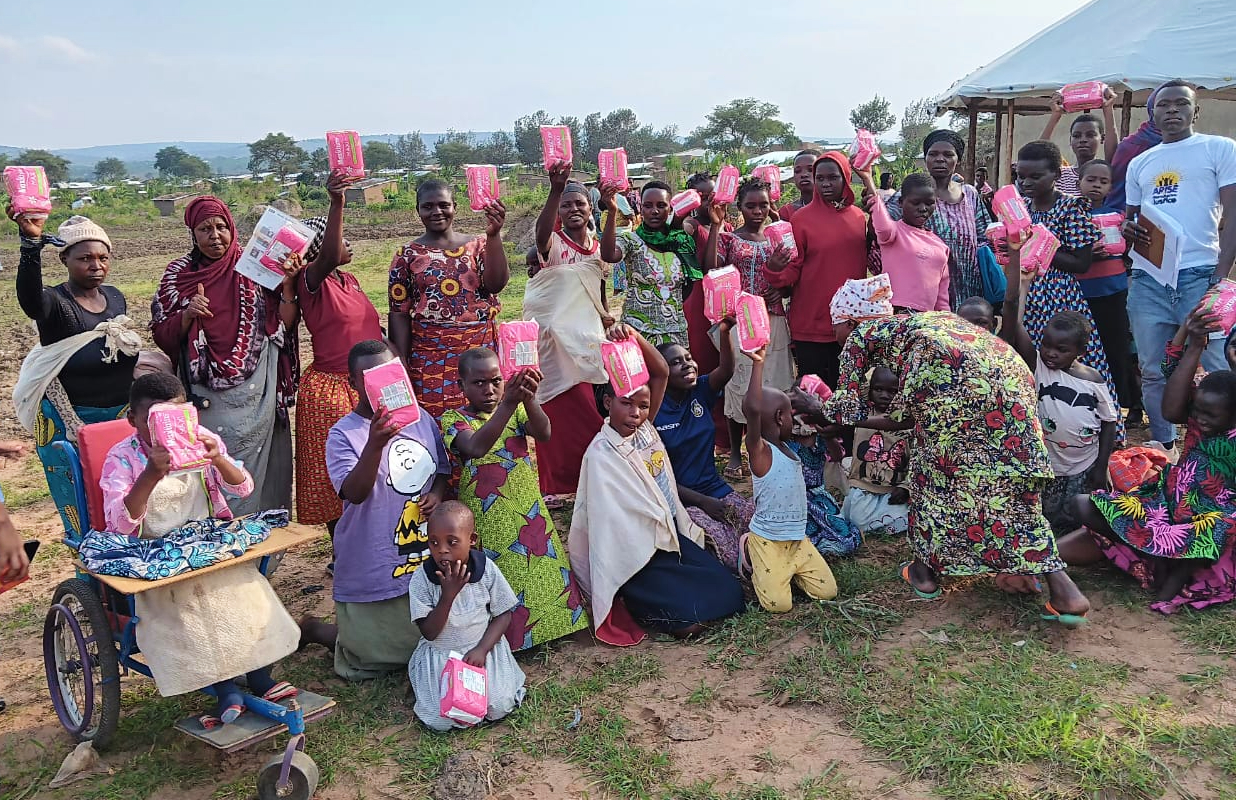Shared Action Africa Empowers Youths with Disabilities in Menstrual Hygiene Management in Rubondo Village Nakivale Refugee Settlement.
In Rubondo Village, Nakivale Refugee Settlement, Isingiro District, Uganda, a major advancement in inclusive sexual and reproductive health and rights (SRHR) has been made as Shared Action Africa expands its menstrual hygiene services to refugee youths with disabilities, equipping them with the knowledge, resources, and confidence to manage menstruation with dignity. This initiative addresses the urgent needs of young people with disabilities, who remain among the most marginalized groups in refugee communities and often face barriers that hinder their social participation.
Through focused training sessions, Shared Action Africa instructs youths not only on proper menstrual hygiene practices but also on integrating smoothly into community life during menstruation and in everyday activities. Oyera Shiba, Assistant Sexual and Reproductive Health Officer at Shared Action Africa, emphasized the organization’s approach: “As Shared Action Africa, we are empowering dignity through action. We distribute sanitary pads to people living with disabilities in Rubondo while supporting caregivers with knowledge and awareness on how to help their children and relatives manage menstruation effectively.”
For many young women involved, menstruation had long been a source of isolation, shame, and anxiety. Participants recounted the emotional and social difficulties they faced prior to the intervention. “We were often isolated in our communities because of our nature. This made us hate ourselves and avoid interacting with our peers, fearing ridicule and exclusion,” said one participant. Limited access to sanitary products compounded these challenges, as many could not afford disposable pads due to unemployment or physical limitations, leaving them exposed to discomfort, health risks, and stigma.
Before Shared Action Africa’s program, girls with disabilities frequently experienced menstrual leakage in public spaces, increasing feelings of embarrassment and exclusion. “During our menstrual days, we couldn’t clean ourselves properly because of our conditions. Sometimes, our periods would drop, and we feared going out into the community,” one participant explained. This lack of menstrual hygiene management (MHM) support prevented many from fully participating in social, educational, and recreational activities.
Since the initiative’s inception, the situation has changed dramatically. The organization provides comprehensive guidance on personal hygiene, safe use of disposable pads, and strategies to navigate community life during menstruation. Caregivers also receive specialized training, reinforcing hygienic practices and offering support at home.
The impact on the youths has been significant. Many report restored confidence and improved relationships within their communities. “After Shared Action Africa’s training, we feel like we’ve regained our rights. People no longer laugh at us; instead, they help and support us during our periods. We associate normally with others, and there are no negative impacts on our daily life in the community,” shared one young woman.
Providing free disposable sanitary pads has been a critical aspect of the program. For youths unable to purchase menstrual products, this support has reduced financial stress and ensured consistent hygiene management. Participants expressed gratitude, noting that the pads help prevent infections and preserve dignity.
Additionally, the program has raised awareness across the broader community. By educating youths and caregivers, Shared Action Africa fosters understanding and empathy. Community members now provide assistance during menstruation and advocate for inclusive practices accommodating people with disabilities.
“This program has not only addressed the practical needs of menstrual hygiene but has also restored confidence, self-esteem, and social inclusion for youths with disabilities,” Shiba added. “It is a demonstration of how inclusive approaches in SRHR can transform lives, promote dignity, and strengthen community cohesion.”
Shared Action Africa continues to champion the rights of marginalized populations, including refugees and persons with disabilities, ensuring equitable access to essential SRHR services. Their commitment to empowering dignity through action reflects a vision of inclusive development in which every young person can participate fully in their communities, regardless of physical or social barriers.
Through these programs, young women in Rubondo Refugee Settlement are reclaiming their agency, managing menstruation with dignity, and experiencing renewed belonging in their communities. Their stories illustrate the transformative impact of compassionate, inclusive interventions in fostering both personal empowerment and social cohesion.

